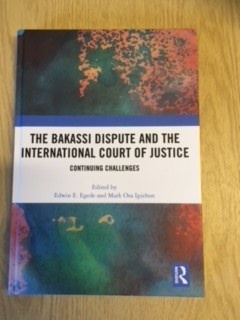This is a past event
The School of Law, University of Aberdeen is hosting a lunchtime event in partnership with AUCEL: Aberdeen University Centre for Energy Law, PIL: Public International Law Research Group and NRG: Aberdeen Nigeria Research Group.
The event is in support of the new Routledge publication - The Bakassi Dispute and the International Court of Justice- Continuing Challenges.
The new Routledge publication is edited by Dr Edwin Egede of Cardiff University and Dr Mark Osa Igiehon, Fellow here at the University of Aberdeen School of Law. Another UoA contributor is Eddy Wifa, a doctoral candidate who with two other academics, co-authored chapter on Joint Development Agreements and the missed opportunities in the Bakassi dispute.
The Bakassi Dispute and ICJ (International Court of Justice) Decision:Following many decades of boundary disputes which sometimes degenerated to armed conflict, Cameroon filed suit and referred the Bakassi dispute to the International Court of Justice. On the 10th of October 2002 the International Court of Justice delivered the Bakassi decision, which, amongst other things, excised the resource rich riverine and maritime territory of Bakassi from Nigeria and transferred its legal title to Cameroon. The two countries under the auspices of the United Nations established the mechanism of the Cameroon-Nigeria Mixed Commission to honour and implement their obligations under the ICJ decision. Over a decade after the ICJ decision this volume brings together academics and practitioners to assess the impact of this decision and the challenges and issues that have been raised by the decision and in the course of its implementation.
The book comprehensively examines the implications and continuing challenges of the ICJ decision.- Public international law principles of revision of ICJ decisions and the Joint development agreement; are examined as missed opportunities in the Bakassi case.
- The role of preventive diplomacy in peaceful settlement of international disputes is also examined as well as the mechanism of mixed commissions.
- The Bakassi dispute was as much an international maritime boundary dispute as well as a contest for the rich mineral resources of the Bakassi peninsular. Thus the book examines the implications for exploitation of petroleum in contested waters.
- The book examines the case management of international law litigation and what lessons to be learned from the manner by which Cameroon and Nigeria respectively pursued the dispute and litigation.
- The status of the Bakassi peoples transferred from Nigeria to Cameroon remains controversial and this is examined in the light of indigenous people’s rights and human rights.
- The implications of the ICJ’s decision which declined to give effect to pre-colonial treaties entered into between the European powers and pre-colonial African kingdoms and states, but instead gave effect to the treaties by which the colonial powers divided Africa, are examined.
For any queries please contact migiehon@abdn.ac.uk
- Speaker
- Dr. Mark Igiehon
- Hosted by
- Dr. Mark Igiehon
- Venue
- The Sir Duncan Rice Library
- Contact
-
Dr. Mark Igiehon - migiehon@abdn.ac.uk

